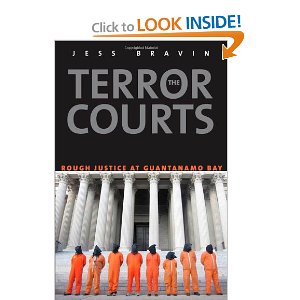“The Terror Courts”: An Inside Look at Rough Justice, Torture at Guantánamo Bay
Wall Street Journal journalist Jess Bravin reports on the controversial military commissions at Guantánamo. Describing it as “the most important legal story in decades,” Bravin uncovers how the Bush administration quickly drew up an alternative legal system to try men captured abroad after the Sept. 11 attacks. Soon evidence obtained by torture was being used to prosecute prisoners, but some military officers refused to take part. We speak to Jess Bravin, author of The Terror Courts: Rough Justice at Guantanamo Bay, and to Lt. Col. Stuart Couch, a former Guantánamo prosecutor featured in the book. [includes rush transcript]

Headline Links to Video. Book Links to Amazon.
Soon after the September 11 attacks in 2001, the United States captured hundreds of suspected al-Qaeda terrorists in Afghanistan and around the world. By the following January the first of these prisoners arrived at the U.S. military’s prison camp in Guantanamo Bay, Cuba, where they were subject to President George W. Bush’s executive order authorizing their trial by military commissions. Jess Bravin, the Wall Street Journal’s Supreme Court correspondent, was there within days of the prison’s opening, and has continued ever since to cover the U.S. effort to create a parallel justice system for enemy aliens. A maze of legal, political, and moral issues has stood in the way of justice—issues often raised by military prosecutors who found themselves torn between duty to the chain of command and their commitment to fundamental American values.
While much has been written about Guantanamo and brutal detention practices following 9/11, Bravin is the first to go inside the Pentagon’s prosecution team to expose the real-world legal consequences of those policies. Bravin describes cases undermined by inadmissible evidence obtained through torture, clashes between military lawyers and administration appointees, and political interference in criminal prosecutions that would be shocking within the traditional civilian and military justice systems. With the Obama administration planning to try the alleged 9/11 conspirators at Guantanamo—and vindicate the legal experiment the Bush administration could barely get off the ground—The Terror Courts could not be more timely.
Phi Beta Iota: Virtually all of the prisoners have ultimately proved to be of almost no value at all, and no substantive information has been produced by torture or “harsh measures.” We have chalatans setting policy and drones executing it — with occasional exceptions such as the hero of this book, a military prosecutor who refused illegal orders and made it stick. Imagine a government in which ever person had this kind of intelligence with integrity, with loyalty to the Constitution rather than the chain of command.
See Also:



